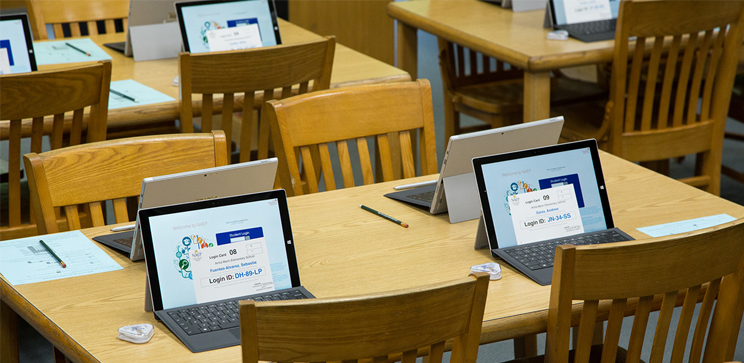- Surveys & Programs
- Data & Tools
- Fast Facts
- News & Events
- Publications & Products
- About Us
- Home
- About NAEP
- Assessment Design
NAEP Design Advancements
The National Center for Education Statistics (NCES) is committed to using the latest research and cutting-edge technologies in developing assessments, and collaborates with a wide range of advisory groups on content, modeling, methodology, and reporting.
Past, current, and future initiatives for the National Assessment of Educational Progress (NAEP) include
- evidence-centered design (ECD),
- new item types,
- enhanced survey questionnaires and index scores,
- NAEP advisory committees and conferences,
- new assessment design, and
- the Survey Assessment Innovation Lab (SAIL).
Evidence-Centered Design in NAEP
To ensure that the assessment development process remains innovative, NCES applies evidence-centered design (ECD) principles to NAEP assessments. ECD provides an evidence-driven framework for designing, producing, and delivering assessments. It is used as a tool to support developing assessments with clear links for measuring and reporting goals.
In NAEP, multidisciplinary design teams establish clear goals and assessment designs. Teams include cognitive scientists, user experience professionals, assessment developers, and psychometric staff. The ECD process requires documented, explicit links among the purpose for a test, the claims made about test takers, the evidence supporting those claims, and the test takers’ responses to the tasks that provide the evidence. The ECD process provides a logical and systematic method of developing NAEP assessment and tasks and questions based on the knowledge and skills outlined in subject frameworks.
A Brief Introduction to Evidence-Centered Design offers additional information.
Learn MoreNew Item Types
Explore the evolution of NAEP assessments, from interactive science tasks to the first digitally based assessment administered in 2017.
 Digitally Based Assessments
See the mathematics and reading digitally based assessments.
LEARN MORE
Digitally Based Assessments
See the mathematics and reading digitally based assessments.
LEARN MORE
 Technology and Engineering Literacy (TEL) Assessment
In 2014, the computer-based technology TEL assessment challenged students to solve real-life problems, providing a level of authenticity previous assessments could not provide.
LEARN MORE
Technology and Engineering Literacy (TEL) Assessment
In 2014, the computer-based technology TEL assessment challenged students to solve real-life problems, providing a level of authenticity previous assessments could not provide.
LEARN MORE
 Writing Computer-Based Assessments
In 2012, NCES conducted a study of computer-based writing at grade 4; lessons learned provided insights into administration.
LEARN MORE
Writing Computer-Based Assessments
In 2012, NCES conducted a study of computer-based writing at grade 4; lessons learned provided insights into administration.
LEARN MORE
 Science Interactive Computer Tasks (ICTs)
In 2009, NCES administered ICTs that provided students with more opportunities to demonstrate skills involved in science without the logistical constraints of a natural or lab setting.
LEARN MORE
Science Interactive Computer Tasks (ICTs)
In 2009, NCES administered ICTs that provided students with more opportunities to demonstrate skills involved in science without the logistical constraints of a natural or lab setting.
LEARN MORE
Survey Assessment Innovation Lab
The Survey Assessment Innovations Lab (SAIL) was formed as a result of the 2013 Future of NAEP conference. SAIL, part of an expanded assessment research and development initiative, supports and oversees a portfolio of innovative research studies essential to keeping NAEP at the forefront of innovation and best practices. Current efforts focus on
- what is being assessed: new models of 21st-century skills;
- how it is being assessed: new technologies to simulate and capture complex human interactions; and
- scoring and reporting: innovations in automated scoring, complex modeling, and score reporting.
Current NAEP SAIL projects include
- improving assessment of key science practices, skills, and ideas through a tablet-based NAEP virtual laboratory;
- assessing students’ inquiry and information-gathering skills in an immersive environment; and
- capturing hard-to-measure STEM constructs with virtual objects and manipulatives.
This page will include links to the results of these studies as they become available.
Last updated 06 July 2022 (DS)


